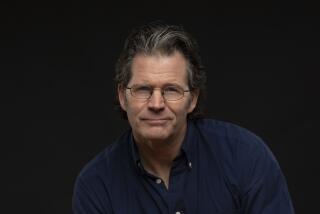One Boy’s Life, Defined and Cataloged
- Share via
Midway through Andre Alexis’ first novel, “Childhood,” the first-person narrator, Thomas MacMillan, defines a curious, perhaps invented, word: “Archephilia,” which, we are told, means “1. A love of order, manifest in the search for system (material or spiritual) in circumstances not obviously ordered. 2. In its metaphysical sense, Archephilia is the desire for dissolution in the oneness that precedes order. 3. (derogatory) The persistent search for order where none exists.”
The definition comes from “Wing’s Abstractions: A Cyclopedia of Unusual Conceits,” a book compiled by Henry Wing, Thomas’ mother’s eccentric and likable admirer, but in capsule it conveys the task that Thomas has set for himself in this fresh, meditative book.
Born into a world of some chaos, and much sadness, Thomas maintains his psychological integrity by insistently searching for order, in his life and in the lives that impinge most on his. He draws timetables of his daily activities. He appends glosses and footnotes to his own story as he tells it. He catalogs and enumerates his behaviors and habits of character along with those of the key players in his childhood.
Although Alexis’ narrative technique might seem to make for disconnected storytelling, in fact what Thomas himself calls his “overdeveloped powers of observation” succeed in capturing the process by which an adult mind reviews the experience of childhood. There are gaps; comprehension is often imperfect and fragmentary. And Thomas’ childhood is itself particularly fragmentary: Of Trinidadian background (like the author), Thomas is born in Canada in 1957 to 17-year-old Katarina MacMillan, who soon abandons him. (His father is never conclusively identified.) He grows up in Petrolia, southern Ontario, in the care of Edna MacMillan, his severe, drinking, Dickens-reading maternal grandmother, a former schoolteacher.
Edna dies when Thomas is 10, and suddenly, Katarina enters his life. After having spent years assembling information about his mother from his grandmother and their neighbors, Thomas now comes face to face with the free-spirited, ultimately impenetrable woman herself. “You’d have called her levelheaded,” Thomas says in a representative example of his ordering, “but for the fact
“a) she’d abandoned her child
“b) she’d never visited, though she’d written as if she might have liked to
“c) she returned for her only child two weeks after her mother’s death, but penniless in the company of a penniless man who seemed not to like children”--and so on.
The penniless man abandons Katarina and Thomas. They walk to Ottawa, where they move in with her mother’s friend and (apparent) former lover, Henry Wing. Passionate about two things--ideas and Katarina--Henry is “a black man with Chinese blood, handsome, tall, forty years old . . . my father perhaps.” Henry becomes Thomas’ surrogate father for a time, sharing his vast library and introducing the boy to the secrets of his laboratory, where he practices alchemy, one day seeming to transform raccoon manure into gold. In truth, he is showing Thomas that “if gold were so easily made, it would be worthless; that the idea of gold is infinitely more precious than gold itself.”
In a novel like “Childhood,” where plot and storytelling are spare, such moments acquire special resonance. The notion that the idea of gold is more precious than gold itself can in a way apply to the alchemy that Thomas is seeking to transform Henry and Katarina into plausible parents. Yet it is not to be. Katarina’s spirit refuses to be reined in; Henry’s love for her, infused with a “singular dignity,” remains ineffectual; and Thomas himself tells a lie that contributes to what he calls, in one of the book’s many felicitous phrases, “the end’s beginning.”
After Henry and Katarina part, Thomas goes on living with Henry until he is ready to set out on his own. The story advances to Henry’s and Katarina’s deaths, and the further subtle conclusions Thomas draws from the lives of these strange but vivid people.
If “Childhood” falters, it is in the area of feelings being pushed too far down. After his mother’s death, Thomas reports that he manages to “throttle” his emotions; in a way, his insistent ordering throttles the emotion of the novel as well. Yet one of the many virtues of “Childhood” is that it never overreaches its own elegant and understated parameters. When Thomas declares, “After all, I come from somewhere,” the reader affirms, and admires, the significance of the journey the narrator has taken.
More to Read
Sign up for our Book Club newsletter
Get the latest news, events and more from the Los Angeles Times Book Club, and help us get L.A. reading and talking.
You may occasionally receive promotional content from the Los Angeles Times.








